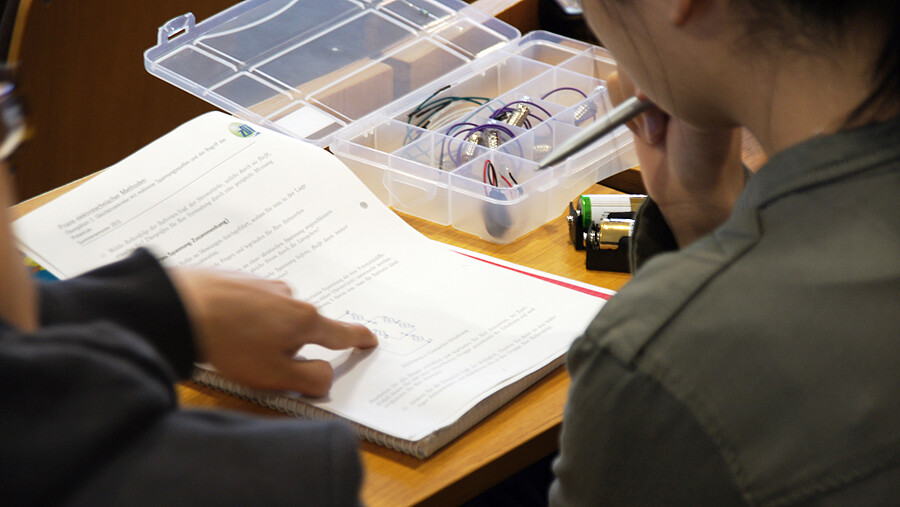Electrical Engineering as subject in the Bachelor’s Teacher Training Course for Technical Education
(Bachelor of Science)
Profile
German HZB: none
International application: German C1
Find out more
Pre-study internship (recommended)
Stay abroad possible, but not obligatory.
Short Description
Electrical Engineering is offered as a vocational subject within the bachelor's programme Technical Education. In addition, a second teaching subject must be studied. Please note the subject combination options.
Within the vocational subject area of Electrical Engineering, students acquire both specialist and teaching methodological skills.
In the specialist area, students initially gain basic knowledge of mathematics, science and electrical engineering. Foundations from the area of Computer Engineering complement the range of courses, offering students a broad basis. After completing this stage, students may expand on individual content from the areas of automation technology, power engineering and microelectronics in an orientation module.
The area of teaching methodology is strongly geared towards the teaching profession, enabling students to take on small teaching assignments at a very early stage. With teaching methodological support, students supervise learners with no previous knowledge of Electrical Engineering, enabling them to recognise the difficulties and misconceptions that beginners have in the subject of Electrical Engineering. In additional courses, students learn the teaching methodological foundations required to enable them to plan and implement their own teaching elements at a vocational school by the end of the Bachelor’s degree Programme.
Course Content
- Automation technology
- Microelectronics
- Power engineering
Students complete the following specialist modules during the degree programme:
- Mathematics I and II (basics of mathematics)
- Basics of Electrical Engineering (electrical engineering foundations of networks, fields, semiconductors, etc. as well as their historical examination)
- Basics of Science
- Computer Engineering I and II (computer engineering basics as well as an introduction to and specialisation in programming languages)
- Electrical Engineering Laboratory Practicals (application of electrical engineering and IT foundations on the basis of individual laboratory experiments)
- Orientation module (basics of power engineering, automation technology and microelectronics)
Furthermore, students complete the following teaching methodology modules:
- Electrical Engineering Projects (application of electrical engineering and IT basics on the basis of projects with a reference to teaching)
- Basics of Teaching Methodology I (foundations of scientific study, teaching methodological concepts)
- Basics of Teaching Methodology II (lesson planning, implementation and evaluation, teaching plans)
- To the module catalogue (German langage only)
In addition to the skills required in the teaching profession (e.g. an interest in imparting knowledge, enjoyment of teaching, the ability to work under pressure, patience and empathy), in the area of Electrical Engineering students should also possess strong powers of imagination and abstraction, an interest in mathematical and technical issues and the ability to think logically.
- Teaching at a vocational school (vocational school, vocational grammar school, technical school)
- Teaching activities for in-company training and further training
- Electrical Engineering as subject in the Master’s Teacher Training Course for Technical Education (Master of Education)
- Master’s Teacher Training Course for Technical Education (Master of Education)
Under certain conditions, admission to the following Master''s programme is also possible. More detailed information can be found in the respective admission regulations. If you have any questions, please contact the course advice of the desired Master''s programme:
Admission Requirements
Some subjects in the Bachelor Teacher Training Course for Technical Education are restricted: Computer Science, English Studies (school subject: English), Food Science, German Studies (school subject: German), Politics and Sports.
Some subjects in the Bachelor Teacher Training Course for Technical Education are admission-free: Catholic Religious Education, Chemistry, Colour Technology and Interior Decoration, Electrical Engineering, Mathematics, Metals Technology, Physics, Plant Operations and Manufacturing of Wood Products, Protestant Religious Education, Spanish Studies and Site Engineering.
The exact admission requirements can be found in the admission regulations:
Application Deadlines
For a subject combination with at least one subject with restricted admission:
1 June - 15 July of the year for the winter semester
- First-year students (application for the 1st semester) can only apply for the winter semester.
- Those continuing their studies (application for higher semesters) can also apply for the summer semester (1 December - 15 January).
For a subject combination with two admission-free subjects:
1 June - 30 September of the year for the winter semester
- First-year students (application for the 1st semester) can only enrol in the winter semester.
- Students resuming their studies and transfer students (application for higher semesters) can also enrol in the summer semester (1 December - 31 March).
The following applies to applications from non-EU countries:
- VPD from uni-assist OR a passed assessment test (Feststellungsprüfung) of a preparatory foundation course (Studienkolleg) is required.
- Applications for the Studienkolleg must be submitted by 15 July.
Do you have questions about studying? We are happy to help!

30167 Hannover

30167 Hannover









